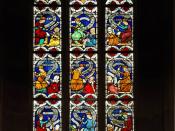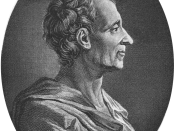The "Persian Letters" (Letters XI - XIV) illustrate a classic question in philosophical thought: is man meant to live life by desire or virtue, and what happens if either case is taken to an extreme. Montesquieu illustrates this in letters written by Usbek to Mirza, and a story of a clan of Troglodytes who have created a city (so to speak) first ruled by their own desires as individuals (or their own selfish desires) and then through time, come to live by virtue, and later an attempt at the formation of a government - where the story ends.
The story can roughly be divided into three parts - as it spans four letters: 1) Letter XI illustrates the Troglodytes living by their desires, 2) Letters XII and XII focus on the Troglodytes living by virtues, and 3) Letter XIV demonstrates the Troglodytes difficulty in forming a government.
The story as a whole is a fable, with Montesquieu pointing out in the first part that men should not live by their desire.
The Troglodytes are depicted as humans decedent from animals, and "were so wicked and so ferocious that there existed among them no principle of equity and justice." They were once ruled by a king who sought to abandon them of their wicked ways, but they soon killed him off, denouncing all government, and living by selfish whims. They soon fall prey to what Hobbes and Locke describe as a state of nature, where basically only the strongest survived. And through their "cupidity" they soon all fall prey to each other in one way or another: wives are stolen, as well as land, and material possessions. Even ties to neighboring countries are cut off; when a mysterious illness plagues their lands a foreign doctor arrives and cures them,


